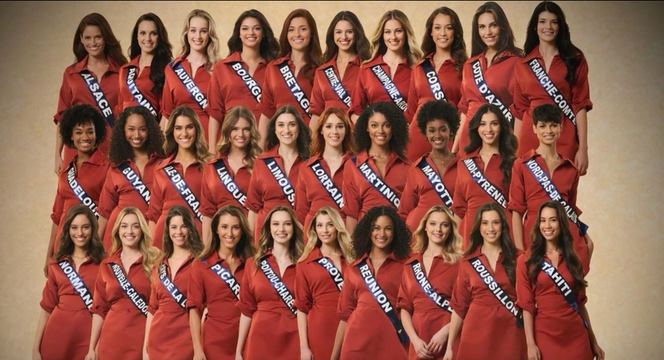


Looking at the list of candidates for the Miss France 2024 title, it's hard to notice that the entry criteria have changed. As is the case every year, the 30 photos of the young women competing on Saturday, December 16, give an impression of uniformity. Yet this edition is the second to be held with more flexible starting criteria. Gone is the age limit – previously set at 24 – and candidates can now be married, have children and even have visible tattoos.
That's the theory; in practice, the average age has hardly changed (it remains just under 22, with 80% of contestants being under 25 and the eldest 28), not a centimeter of inked skin can be seen, and none of the regional Misses are mothers. There is one small visual discrepancy that might catch the eye: "For the first time, there's a young woman with short hair," stated Alexia Laroche-Joubert, president of the Miss France company from 2021 to 2023 and current head of Banijay France (the Miss France brand's owner via its subsidiary Endemol). So much for diversity.
One criterion, however, remains "impossible to change": the minimum height of 1.70 meters. And for a "very technical reason": "The show is live and we don't know in advance which candidates will advance through the stages, so we can't make dresses that fit girls of 1.60m as well as 1.80m, nor can we sew hems live." OK.
The debate about the Miss France pageant's lack of representation and diversity isn't new, but it has grown increasingly heated: In October 2021, the feminist association Osez le Féminisme! filed an appeal with the labor courts to denounce, among other things, a "discriminatory and illegal recruitment process," which was not upheld.
For want of changing things from the inside, several parallel contests have sprung up: "I've seen a dozen of them appear over the last two or three years, and today there must be over a hundred," said Elsa Schwebel, president of the organizing committee for one such contest, Ambassadrice France, founded in 2019. It's precisely because she couldn't compete in Miss France on account of her height (1.65 m) that Schwebel launched this alternative, which imposes only an age requirement (being under 30), "to enable those who couldn't enter it to live out their girlhood dreams."
It has to be said that, even though it has run for five years, media coverage of this parallel competition – whose 2024 edition was held on November 25 – has remained fairly low-key, limited to the local press. It's not for want of contacting national TV channels, lamented Elsa Schwebel, who has "never heard anything back." The same is true of Miss Handi France, which was launched in 2013 in response to the lack of representation of people with disabilities at Miss France. "We'd like to get a bit more media coverage, but we're having trouble making ourselves known," said its organizer, Laetitia Champenois, who has been unable to talk to either the main TV channels or the Miss France committee.
You have 40% of this article left to read. The rest is for subscribers only.
